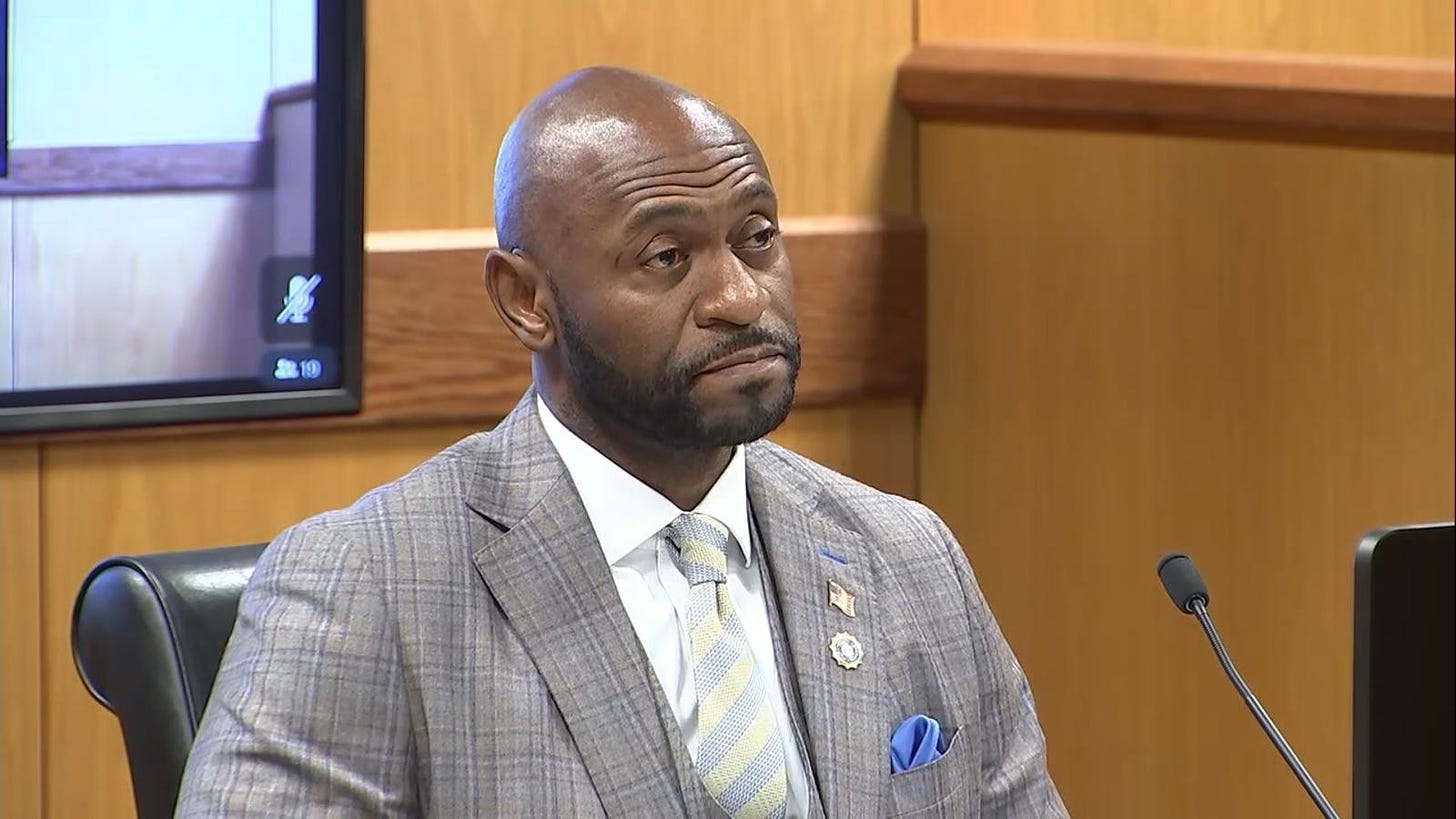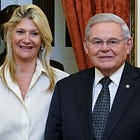Welcome to the Weekend Wrap! Let’s get caught up on what’s happened in the white collar world while I’ve been away.
Trump Prosecutions
New York State Case - Hush Money/False Business Records
The trial in the New York case was supposed to begin tomorrow. Instead the judge will hold a status hearing and has postponed the trial date to at least April 15. He did this with the government’s consent after the defense recently received more than 100,000 pages of documents from federal prosecutors in the Southern District of New York. The documents relate to that office’s prosecution of former Trump attorney Michael Cohen and other matters related to that investigation.
Cohen pleaded guilty in 2018 to federal campaign finance violations for the 2016 hush money scheme involving adult film star Stormy Daniels, who was ready to go public with her story about a sexual encounter with Trump. Those same allegations underlie this state indictment of Trump for creating false business records to conceal the scheme. Cohen is expected to be a key state witness at Trump’s trial. Materials about his federal case could therefore be important for the defense impeachment of Cohen, among other things.
It’s not completely clear why these documents were not produced earlier or who is to blame. The judge was understandably annoyed and has asked the parties for a detailed timeline to explain what happened.
In a pleading filed last week, the DA pushed back hard on the notion that there was any misconduct here. He argued: 1) materials in the hands of federal prosecutors are not controlled by the state and are therefore not part of the state’s discovery obligations in the first place; 2) despite that, prosecutors made good-faith efforts to obtain all relevant materials from the federal investigation and turned those over months ago; 3) most of the new materials are redundant, irrelevant, or not helpful to the defense; and 4) the late production is “entirely a result of defendant's own inexplicable and strategic delay in identifying perceived deficiencies in the People's disclosures and pursuing independent means to obtain that evidence.”
We should have a better idea of the status of the case after tomorrow’s hearing. The judge could delay the trial even further or impose additional sanctions for the late production, but he’s extremely unlikely to dismiss the case as Trump has requested. Based on what has come out so far, it appears there’s a good chance the trial will now proceed in April. Trump is running out of ways to seek further delays.
Pretrial Motions: In other NY news, Judge Merchan resolved a number of motions as part of the process of getting the case ready for trial. He rejected almost all of Trump’s attempts to limit the government’s evidence, including motions to bar testimony from Cohen, Daniels, and former Playboy model Karen McDougal. The judge properly ruled that most of the defense arguments were matters for objections and rulings at trial and arguments to the jury about credibility but were not a basis to exclude a witness’s testimony completely.
Judge Merchan also denied Trump’s request to rely on a “presence of counsel” argument. Trump’s lawyers had tried a kind of cute move that proved to be too cute for the judge. They said Trump would not present a defense that he relied on the of advice of counsel, which would require that he waive attorney-client privilege and provide discovery to the government regarding that advice. But they said they still wanted to argue to the jury that, when deciding whether Trump had criminal intent, the jury could consider that he knew there were lawyers present and involved in the events. The judge properly saw this as a back-door attempt to obtain the benefits of an advice of counsel defense without any of the corresponding obligations. He shut it down, holding that Trump’s attorneys may not offer, or even suggest, any such argument.
The judge partially granted Trump’s motion to prevent prosecutors from relying on the infamous “Access Hollywood” tape with Trump’s “grab ‘em by the pussy” remarks. Prosecutors want to argue that the Trump campaign was very concerned about the recording, which emerged just before the election, and that this was part of the motive for the hush money payment to Daniels. The judge ruled that playing the actual recording would be too inflammatory but prosecutors may present evidence about the existence of the tape, describe it in general terms, and still make the motive argument. That seems like a reasonable compromise.
All of these rulings are the markings of an experienced and reasonable judge methodically working through the various pretrial issues that need to be resolved. I think the proceedings so far are a good sign that Judge Merchan will handle the trial competently and professionally.
The state intends to present this case as about much more than simply hush money (which is not itself illegal) or sloppy bookkeeping. The prosecution theme will be election interference: the payment to Daniels was part of a scheme to deprive voters of critical information right before the election, and the internal business records falsely characterizing that payment as legal fees were an essential part of the scheme.
Georgia State Case - January 6 Allegations
Disqualification: The biggest news in the Georgia case was that Judge McAfee denied the defense motion to disqualify DA Fani Willis based on an alleged financial conflict of interest. For the last two months several of the defendants have argued that Willis improperly hired a man she was romantically involved with, Nathan Wade, as a special prosecutor, and then personally benefited from that decision when he took her on several vacations. They also claimed that Willis improperly injected race into the case and prejudiced the defense when she gave a talk at a historic black church in Atlanta suggesting that the defense motion was racially motivated.
Nathan Wade testifies at the Georgia hearings on disqualification
After several days of hearings, McAfee ruled there was insufficient evidence of a financial motivation or benefit that would require Willis to be disqualified. There was conflicting evidence about the trip expenses, but testimony from Willis and Wade that she had reimbursed him with cash in at least some cases was not contradicted. McAfee noted that Willis made a good income and there was no evidence that she needed to rely on money from Wade. He also held there was no evidence Willis had tried to draw the case out in order to benefit financially from increased payments to Wade; on the contrary, the state has been the one consistently pushing for trial at the earliest possible date. In short, he said there was no evidence that money was a “motivating factor” in the prosecution.
McAfee also rejected the argument that Willis’s public comments justified dismissal. He noted that she did not mention any of the defendants or attorneys by name, and that jury selection was so far in the future her remarks were unlikely to have any impact. Despite that, he criticized her comments as ill-advised and “legally improper,” and implied he might be willing to consider a defense motion for a gag order preventing the state from making further public comments about the case.
But McAfee did rule that the situation gave rise to an appearance of impropriety that tainted the prosecution. He said “an outsider could reasonably think that the District Attorney is not exercising her independent professional judgment totally free of any compromising influences.” He held there were “reasonable questions” about whether Willis and Wade testified untruthfully about the timing of their relationship. Questions about when the romantic relationship began and other details from the hearings, he said, had left an “odor of mendacity” about the case.
McAfee ruled that this appearance of impropriety required either that Willis (along with her entire office) withdraw from the case or that Wade resign. Wade promptly submitted his resignation and Willis accepted it.
Willis has prevailed for now, but the issue is far from over. The defendants asked Judge McAfee to certify the issue for an immediate appeal, and he granted that request last week. Under Georgia law review is not automatic; the state court of appeals can choose whether to take the case.
In the meantime, McAfee said he would continue to resolve other pending matters to move the case forward. This is a different situation from the D.C. federal case, where by law all action on the case was stayed pending the outcome of Trump’s immunity appeal. The appeal on the disqualification question in the Georgia case can go on in the background while everything else about the case proceeds.
Willis has succeeded, at least for now, in avoiding being kicked off the case. But this was a terrible “own goal” - a “tremendous lapse in judgment,” as Judge McAfee put it. It allowed the defense to completely shift the public narrative surrounding the case away from a conspiracy to steal the election and onto alleged prosecutorial misconduct. Even if the court of appeals does not disturb McAfee’s ruling, a great deal of damage has been done.
After some early successes, with four defendants pleading guilty, there is now a cloud over the case. Trump and the other defendants will undoubtedly continue to use these events to challenge the integrity and legitimacy of the prosecution at every opportunity. This was an enormous gift to the defense.
Meanwhile, there were reports last week that Willis intends to renew her request for an August trial date. Currently there is no trial date set for the fifteen remaining defendants.
Dismissal of Six Counts: Judge McAfee also granted a motion to dismiss six counts in the indictment that charged various defendants with conspiring to solicit public officials to violate their oaths of office. Three of those counts included Trump. The charges alleged that through acts such as Trump’s infamous “perfect phone call” to Georgia Secretary of State Brad Raffensperger asking him to “find” additional votes, Trump and others conspired to solicit various Georgia officials to violate the oaths that they took to uphold the Georgia and federal constitutions.
McAfee ruled that these charges were too vague because they failed to specify which constitutional obligations the defendants were asking the officials to violate. Without that detail, he held, the defendants cannot adequately prepare a defense.
This ruling was not unreasonable. And although having charges dismissed sounds like a big deal, in a case like this it really is not. All of the evidence surrounding events like the Raffensperger phone call can still come into evidence as part of the lead RICO conspiracy charge. These charges simply provided another vehicle to hold defendants accountable for conduct that will still be part of the prosecution. All this ruling really does is streamline the sprawling case a bit — not entirely a bad thing.
Prosecutors could seek to re-bring the charges, but they may not bother. Unlike the federal system, Georgia apparently does not provide for superseding indictments, so they would either have to re-indict the entire case or bring a new, separate indictment including just these charges. They may well decide it isn’t worth it.
Florida Federal Case - Mar-a-Lago Documents
Things are getting even weirder and more worrisome in the Florida case. Judge Cannon held a hearing on a couple of Trump’s many motions to dismiss and promptly denied one of them - a frivolous claim that the Espionage Act, under which Trump is charged with improperly retaining national defense information in the form of the Mar-a-Lago documents, is unconstitutionally vague. But although she denied the motion, she did it without prejudice to Trump’s ability to raise the issue again later. She suggested the question of vagueness may be relevant to how the jury is instructed - but that’s a little puzzling, since unconstitutional vagueness is a question for the judge, not the jury. It’s hard to figure out what she’s driving at here.
Then last week Judge Cannon issued an order that most legal observers agree is best described as bizarre. She ordered both sides to “engage with” jury instructions she proposed regarding Trump’s alleged defense based on the Presidential Records Act. One of them suggested the jury could be allowed to decide whether a former president had designated particular records as personal and thus was entitled to keep them.
That’s not what the PRA provides or how it works - but it is what Trump has been claiming. A jury instruction like that would essentially be telling the jury it could find Trump not guilty based solely on his claim that he just decided all the records at Mara-Lago were his own personal records - even though there’s no legal basis for such a claim. As a number of commentators have pointed out, if that’s the jury instruction she wants to give, she should just go ahead and dismiss the charges now so the government can appeal. It’s also a bit strange that once again Cannon is so focused at this stage on jury instructions, which are usually discussed much closer to trial. She has a huge number of other issues to resolve before worrying about instructing a jury.
It’s not clear whether the problem with Trump-appointee Cannon is inexperience, incompetence, a biased desire to help Trump, or some combination of all three. But these latest events have led to increased calls for Jack Smith to ask the 11th Circuit to take her off the case. That’s a difficult move, but Smith may soon have no choice. He probably needs to at least try to do something about Cannon before trial. If she remains on the case, she will have tremendous power to help Trump through evidentiary rulings or even by dismissing charges after the trial has begun. At that point the double jeopardy clause would prevent the government from bringing the case again.
Delays are one thing, but no one should underestimate Cannon’s power to torpedo the case, including in ways that would be impossible to appeal, if that’s what she wants to do. Jack Smith is painfully aware of that.
D.C. Federal Case - January 6 Allegations
The DC case remains on hold pending the outcome of the appeal to the U.S. Supreme Court on Trump’s claim of absolute presidential immunity. Trump filed his opening brief last week. He made his now-familiar and largely frivolous arguments about the need for absolute immunity so presidents are free to take difficult or controversial actions without fear of future criminal prosecution. The government’s brief is due April 8.
Almost no one expects the Supreme Court to agree with the claim of absolute immunity for a former president. But it’s possible the Court wants to write something denying immunity in Trump’s case while leaving the door open for possible immunity in future cases involving core presidential actions, such as ordering military strikes as commander in chief.
Arguments are set for April 25. Then the big remaining question will be how long it takes the Court to decide the case. Judge Chutkan has suggested she will give Trump about three months to prepare for trial once the case returns to her. If the Supreme Court acted relatively quickly and decided the case in May, that could allow her to begin the trial in August. If the Court waits until the end of its term at the end of June, we could be looking at a September start date. Depending on how the Supreme Court rules, it’s also possible Judge Chutkan will need to hold hearings on whether the acts alleged in the indictment qualify for immunity under whatever standard the Court announces — and that could mean more delay.
The bottom line is that there is still a chance for the D.C. case to begin this fall, but the window is closing. It’s also possible the trial will begin but not be concluded by election day.
Other White Collar News
Judge Denies Menendez Motions to Dismiss
The judge in Senator Bob Menendez’s corruption case denied his motions to dismiss the indictment based on the Speech or Debate clause and separation of powers. As I predicted in the post below, the judge ruled that it appears prosecutors will be able to prove the allegations in the indictment without presenting evidence of any protected legislative acts by Menendez. He also rejected Mendendez’s claim that charging a member of Congress with violating the Foreign Agent Registration Act violates the separation of powers.
As we discussed a couple of weeks ago, Menendez’s co-defendant Jose Uribe has pleaded guilty and agreed to cooperate with prosecutors. Following his guilty plea, prosecutors returned a superseding indictment against the remaining four defendants: Senator Menendez, his wife Nadine, and New Jersey businessmen Wael Hana and Fred Daibes. In addition to the original charges of corruption conspiracies and FARA violations, the new indictment adds more than a dozen additional counts of public corruption and obstruction of justice. It includes new allegations that Menendez and his wife tried to obstruct the federal investigation by falsifying documents to suggest that bribe payments were actually loans.
The trial is currently set for May 6. But assuming Menendez appeals the denial of his Speech or Debate motion, that trial will likely be delayed. Claims of immunity under the Speech or Debate clause entitle the defendant to a pre-trial, or interlocutory, appeal, because they involve a claim of a constitutional right not to be tried at all. In the last Menendez corruption case indicted in 2015, his ultimately unsuccessful appeals of his Speech or Debate claims ended up delaying the trial by about 18 months.
Peter Navarro Goes to Prison
Former Trump advisor Peter Navarro reported to federal prison in Florida last week. The D.C. Circuit Court of Appeals rejected his petition to remain free pending appeal. When he appealed to the Supreme Court, Chief Justice Roberts rejected the appeal without even referring the matter to the full Court.
Navarro was sentenced to four months in prison for contempt of Congress. He was convicted of ignoring subpoenas for testimony and documents from the House January 6 Committee. Along with Steve Bannon, Navarro was one of the chief architects of the plan to overturn the election by falsely claiming voter fraud and then having the electoral ballots from a number of states rejected.
Bannon has also been convicted of contempt, but he was successful in persuading the courts that he should remain free while he appeals his conviction. He claims he was wrongly denied the right to present an advice of counsel defense, an issue that may have some legs, as I discussed here.
Navarro is the first senior Trump advisor, and the first person who was not an actual rioter at the Capitol building, to go to prison for his role in the events of January 6, 2021. I predict he won’t be the last.
Prosecutors Seek 40-50 Years in Prison for SBF
Federal prosecutors urged a judge to sentence Sam Bankman-Fried to 40 to 50 years in prison for his fraud convictions related to the collapse of his crypto-currency exchange FTX. SBF was convicted at trial last November after he was indicted for misappropriating depositer funds and defrauding FTX investors and lenders. Prosecutors noted that this was one of the largest financial frauds in history, with losses of around $8 billion. They also argued that SBF has consistently sought to deny responsibility for his actions, blame others, and obstruct justice.
The requested sentence would mean that SBF, 32, effectively would spend the rest of his life in prison. Defense attorneys have argued that a sentence of around six years would be appropriate. Sentencing is set for this Thursday, March 28.
I wrote this post about the case back when it was first indicted. There were a number of subsequent developments, including a superseding indictment and guilty pleas from several of his co-conspirators, but it will give you more background on the case if you are interested.








Regarding MAL... it almost feels as if, with the weird jury instruction, Judge Cannon is deciding an issue of fact (without evidence from him, that Trump did whatever he needed to do to render the classified documents 'personal') while leaving a question of law for the jury (whether to convict if the documents are personal). I wonder if the special counsel will say that second jury instruction is contrary to law and that if Cannon really thinks that is what the law says she should grant the motion to dismiss the counts right now. (BTW, if Cannon tries to push into trial without deciding some of the pretrial motions - as she seems inclined to do here - would that be grounds for mandamus?)
Regarding the immunity appeal, I'm worried about what SCOTUS will do based on the way they ruled on the Section 3 case. The fact that the majority went further than it needed to in order to decide the case has me thinking that they will not be able to resist doing the same in this case. I think we could be looking at a fractured plurality opinion that send the case down for additional fact finding (with Trump as defendant unwilling to provide any evidence anyway).